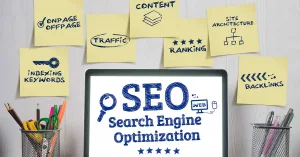Digital marketing is vital for small business owners who want to grow their customer base and brand. However, having the best digital marketing is an elusive goal. There are so many techniques that you can employ to get your business’s name out there online. These techniques often take a lot of work for them to have the desired effect. So, how do you know which digital marketing strategies you should try for your small business? In this guide, we’re going to explore the different digital marketing tactics that successful small business owners use, and how to put them into practice.
What Will a Digital Marketing Strategy Offer You?
Quite a few small business owners do not think that they need to dedicate many resources to digital marketing. The largest competitors already seem to have control over the search engine results, so what’s the point? Just because you might not appear on the first page of Google, doesn’t mean digital marketing won’t get you results. Depending on your plan for your small business, the main goal of digital marketing is twofold:
More Customers
Whatever your target audience is for your products or services, a business-to-customer digital marketing strategy will help you hone in on them. By targeting your online content and marketing to a specific group of people who are more likely to shop in your store’s niche, digital marketing allows your business to attract customers who are far more likely to convert. This, of course, leads to more profit, and as long as you keep working at it your business will continue to grow. The more customers you reach with your digital marketing, the more your website will be pushed up in online rankings, and the easier it is for others to find your small business.
Strengthened Brand
Many forms of digital marketing require you to hone in on your small business’s niche, and what you can offer over your competition. By creating a steady flow of online content and marketing materials with this in mind, your small business’s branding will be consolidated. This is great for business-to-customer marketing, as potential buyers will know right away if you’re the best choice for them. However, a strengthened brand also contributes to your success in terms of reaching out to potential partners, as well as any bloggers in your niche that you want to employ for influencer branding.
With the right combination of techniques, you can build up your business’s customized digital marketing strategy. When you consider the long-term benefits of digital marketing, it’s also much more affordable than paid ads. All this contributes to your small business’s overall growth and helps you stake a claim in your niche. Now we know why digital marketing is both beneficial and important to your marketing strategy, let’s take a look at some of the specific tactics you can use.
What Are the Different Digital Marketing Tactics?
When businesses first began to utilize the internet for marketing, as long as your ads were refreshing and eye-catching, you could stand out from the competition. SEO and blogging came into use to take advantage of search engines’ algorithms, and have remained two mainstays of digital marketing techniques. While they are still vital to digital marketing, now there are a variety of tactics to put into practice on top of keywords. Employing each of the below techniques in some way will put you miles ahead of your competition.
SEO - As the tried and tested favorite, you’ll struggle to come across a business owner who isn’t at least familiar with SEO. Search engine optimization refers to the practice of optimizing all your online copy for search engines. This is done by using keywords and phrases that are commonly searched for by people shopping or exploring in your niche. You can find these keywords by using a free SEO keyword service, of which there are many online, and by researching what searches bring up which results in your niche. The suggested searches at the bottom of the Google results page are a great place to start.
Blogging - For the best results, you should opt to use keywords in your blogs that are high volume and low competition, i.e a lot of people are searching for them, but not many other businesses are capitalizing on them. This way you can make these keywords your own. Moving away from keywords, you can also generate SEO when other sites link to your blog. These are called backlinks, and they can either be created organically by providing great content that people want to link to, or you can propose a backlink exchange with another site.
Advanced SEO Practices - For the biggest chance at ranking highly on search engines, your entire site needs to be optimized with keywords and phrases. That means micro-text, as well as images and video that are embedded into your site, too. However, the most effective SEO doesn’t just focus on keywords. You can also climb the ranks on search engines by keeping users on your site for longer than your competition. This means providing top-notch web design with a smooth user experience and sales funnel, as well as employing lots of different media to hold users’ attention.
Social Media Marketing - This refers to the use of a variety of social media platforms to attract new customers. Billions of people use social media every day, and each site offers small businesses the chance to do something a little bit different. For example, Instagram is perfect for product photos, descriptions, and branding, Facebook is the best for small ads and general info about your business, and YouTube provides an excellent opportunity to employ video marketing. You can also repost your content from your blog, and it’s far easier for potential customers to share your posts and extend your reach for you. Remember, you’ll still need to optimize all your social media posts to keywords.
Email - Email marketing is another classic form of digital marketing, but it has evolved significantly since it was first employed in the late 1990s. To best use email marketing to generate leads, you’ll need to create a mailing list, and consistently provide customers with the chance to sign up to it. Many businesses will offer their users an incentive to sign up to their mailing list, such as 10% off their first purchase. Using email is a smart choice if you have a lot of leads on your mailing list who haven’t yet made a purchase, so they are stuck in the sales funnel. Marketing emails should be short, snappy, and persuasive to best push these people into making their desired purchases.
eBooks - In much the same way that blogging about topics can attract people who desire this information, releasing ebooks in your industry niche can cement your small business’s position as trustworthy and knowledgeable in your field. eBooks are also great incentives to include in your marketing materials, and you can also offer them to your customers for free. However, good ebooks take a lot of work. If you want them to be effective marketing for your small business then there are no half measures when it comes to the information provided or the quality of writing.
Podcasts - The podcast industry took off in the early 2010s, and has yet to slow down. Podcasting in your business niche provides you with the opportunity to reach out to your customers and potential customers, and build a dedicated audience. Instead of reaching them through social media or search engines, digital marketing through podcasts means you can fit in around their lifestyle. This is greatly beneficial for your branding and sales, as it allows customers to create an emotional connection to what your business can offer.
Video Marketing - This is a highly valuable and versatile tactic to have in your digital marketing arsenal. Not only will video marketing look great on your website and boost your SEO, but you can also use it to elevate your social media marketing, too. However, making great video content takes a lot of skill and a lot of work. Due to this, video marketing is often a little more resource heavy and a little less affordable than other forms of digital marketing. Despite these issues, with good planning, you can create a wealth of video content including product tutorials, backstage peaks at your office or workspaces, introductions to your staff, and general viral marketing for Instagram and TikTok.
Text Message Marketing - Finally, mastering SMS marketing is a wonderful way to put your small business ahead of your competition. Not many small businesses will take advantage of this technique. But, with the right writing, text message marketing can add a valuable personal touch to your digital marketing strategy. Marketing through texts is highly effective, as people are certain to read their messages, often very quickly after they receive them. Remember, you’ll need to ask your customers for permission to use their number to contact them with text marketing materials.
What Should Be Included in Your Digital Marketing?
You might think that if your service and products are up to standard, this is all you need to highlight in your digital marketing strategy. However, to get the most out of the above techniques, it’s useful to know what to highlight when using each one of them.
Blogging and your web design will be dictated by the SEO keywords and phrases you’ve selected for your business. For the first few months at least you should work to target 5-7 keywords. If you’ve already created a website, it should be easy to add your core keywords into the text on your site. As for blog post content, informative articles that offer answers to popular questions, and listicles are always great choices for SEO. Make sure to pay attention to your site analytics, so you know of any pages you need to optimize for user experience.
For email and text marketing, you only have a select number of words to get your message across. An enticing subject line or first sentence, often not more than 10 words is best. Then, include an explanatory sentence, your customer incentive, and a call to action. With email, you can also take advantage of graphic design and add your best SEO product photos. Make sure any images you use are of high enough quality, so as not to detract from your branding.
When it comes to podcasting, eBooks, and video marketing, a lot of planning is needed. You’ll still need to include keywords, of course, but you’ll also need to do a lot of drafts both of your books and your scripts, as well as a lot of editing. In many ways, drawing people in for long periods is harder than short-form marketing, as you need to hold your customers’ attention. With long-form marketing, there’s also a lot more to optimize. If you’re planning on making a video with voice-over or podcasting, you’ll want a voice that suits your small business’s branding. At the beginning and end of every podcast, eBook, and marketing video you should include your relevant social media, hours of operation if you have physical premises, the link to your site, as well as your contact details if you like. Make sure that any information you provide is fully cited. Include your original findings for unique content that your customers can’t get anywhere else.
Sources
- https://blog.hubspot.com/marketing/digital-strategy-guide
- https://mailchimp.com/en-gb/marketing-glossary/digital-marketing/
- https://backlinko.com/advanced-seo
- https://blog.hubspot.com/marketing/benefits-of-email-marketing
- https://www.internalresults.com/blog/benefits-ebooks-content-marketing-strategy
- https://www.business2community.com/podcasts/8-benefits-of-podcast-marketing-for-your-business-02399375
- https://www.rialtomarketing.com/benefits-video-marketing-small-businesses/
- https://blog.hootsuite.com/sms-marketing/





















Add comment